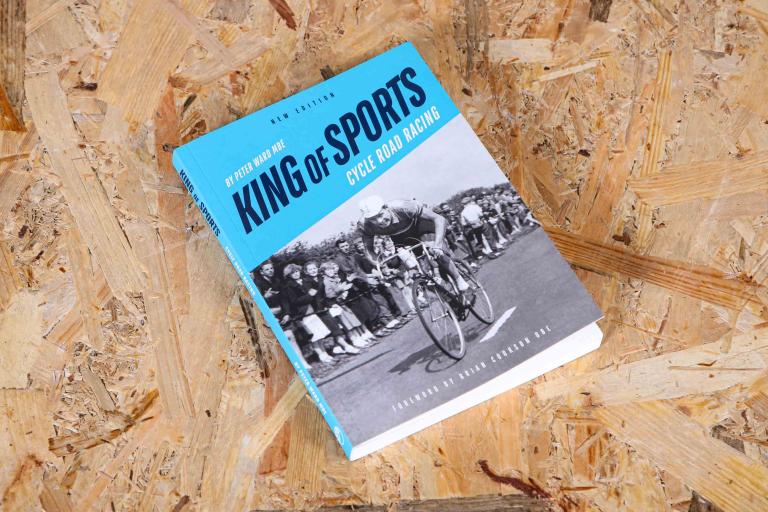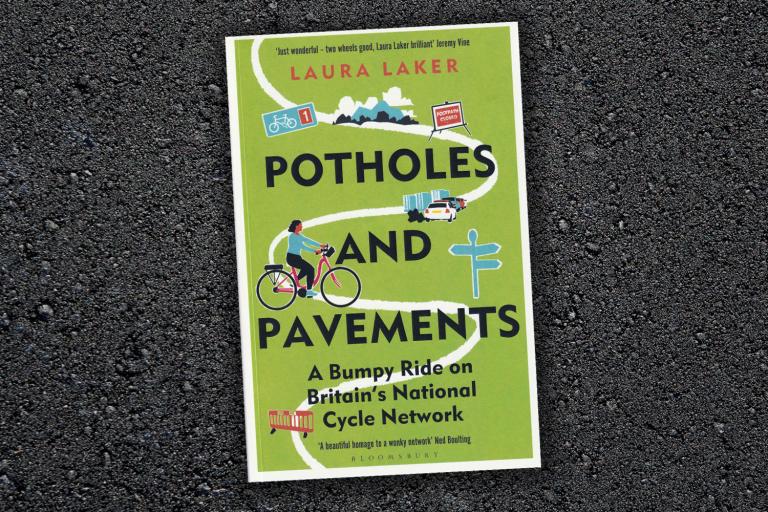- News
- Reviews
- Bikes
- Accessories
- Accessories - misc
- Computer mounts
- Bags
- Bar ends
- Bike bags & cases
- Bottle cages
- Bottles
- Cameras
- Car racks
- Child seats
- Computers
- Glasses
- GPS units
- Helmets
- Lights - front
- Lights - rear
- Lights - sets
- Locks
- Mirrors
- Mudguards
- Racks
- Pumps & CO2 inflators
- Puncture kits
- Reflectives
- Smart watches
- Stands and racks
- Trailers
- Clothing
- Components
- Bar tape & grips
- Bottom brackets
- Brake & gear cables
- Brake & STI levers
- Brake pads & spares
- Brakes
- Cassettes & freewheels
- Chains
- Chainsets & chainrings
- Derailleurs - front
- Derailleurs - rear
- Forks
- Gear levers & shifters
- Groupsets
- Handlebars & extensions
- Headsets
- Hubs
- Inner tubes
- Pedals
- Quick releases & skewers
- Saddles
- Seatposts
- Stems
- Wheels
- Tyres
- Health, fitness and nutrition
- Tools and workshop
- Miscellaneous
- Cross country mountain bikes
- Tubeless valves
- Buyers Guides
- Features
- Forum
- Recommends
- Podcast
review
£13.91
VERDICT:
A worthy effort to rank cyclists' racing exploits, but ultimately just as contentious as other attempts
Clear methodology
Thorough research
Result is no better than previous attempts
Duplication with website
Weight:
510g
Contact:
At road.cc every product is thoroughly tested for as long as it takes to get a proper insight into how well it works. Our reviewers are experienced cyclists that we trust to be objective. While we strive to ensure that opinions expressed are backed up by facts, reviews are by their nature an informed opinion, not a definitive verdict. We don't intentionally try to break anything (except locks) but we do try to look for weak points in any design. The overall score is not just an average of the other scores: it reflects both a product's function and value – with value determined by how a product compares with items of similar spec, quality, and price.
What the road.cc scores meanGood scores are more common than bad, because fortunately good products are more common than bad.
- Exceptional
- Excellent
- Very Good
- Good
- Quite good
- Average
- Not so good
- Poor
- Bad
- Appalling
At some point, most fans of any sport will wonder who deserves the title of 'the greatest of all time'. For cycling, it has always been difficult to make valid comparisons between races and generations, but that doesn't stop people trying. Peloton Legends is the latest effort, and very detailed it is; accepting that it is unlikely to put an end to any arguments, author Eric Bowen would be happy if it prompted a few informed debates about overlooked achievements.
With its title of Peloton Legends, I feared that this book might be yet another compendium of 'my favourite riders', with limited objectivity in the selection. I am thinking here of the unnecessary Hardmen, or the disappointing Breakaway.
However, the subtitle promises something less subjective than previous books: 'ranking the top 100 cyclists of the modern era'. Whenever cyclists debate the ago-old question of who might be the best racing cyclist of all time, there is rarely any disagreement that Eddy Merckx is the answer – and is always likely to be, unless you decided to base your ranking on results in Paris Tours alone*.
However, after that, opinions will be many and varied – and again, always will be.
Applying some science to this sort of thing has been done pretty well before, with a clearly explained scoring process to arrive at the result. One example is Cycling Ranking, and obviously has Big Ted at the top: Sean Kelly is next, followed by Gino Bartali.
Pro Cycling Stats is another: same winner, but Kelly drops to third, and is replaced by Francesco Moser.
Peloton Legends has two different riders on the lower steps of the podium, with Bernard Hinault coming in behind Merckx, and Fausto Coppi in third.
This illustrates the problem: no matter how logical the scoring system might appear, the results won't please everyone. Perhaps the purely personal selection has some merit after all: same risk of disagreement, but at least you won't have spent lots of time on under-appreciated statistical analysis.
It makes me wonder why anyone would willingly embark on a project like this. For Bowen, he simply wanted to make debates better informed, as 'many fans of the sport were sadly unaware of the...great cyclists whose names should come up when discussing the legends of the sport'.
Perhaps that's it – those well versed in the sport's history may well argue for different results, but for those less knowledgeable it can be (yet another) introduction to the sport's greatest riders.
> Buyer’s Guide: 38 of the best cycling books
Throughout the project, Bowen had to make decisions as to what to include or not, and you may or may not agree with them. The book explains Bowen's scoring system fully, but you can see the basics of it on his website. There is a lot of logic to it, and good attention to detail: I appreciated how the points for winning the Vuelta a Espana increased from 4 to 5 in 1974, for example, reflecting the increasing status of the race. Similarly, Francesco Moser didn't get 10 points for setting the Hour record because the UCI moved it into the 'Best Human Effort' category under their new guidelines.
Incidentally, the Hour record is the only track-based event to be counted, so Bradley Wiggins gains the 34 points that put him in 75th place without the benefit of his Olympic successes. It may seem unfair these days, but there is no doubt that until the medals started flowing recently, few in the UK would have fought for greater recognition of track results.
Unusually, Bowen compensates riders who could not compete for various reasons – typically war or injury. Greg LeMond would be a good example of the latter, and is awarded an extra 13 of his 66 points because of his time out while recovering from being shot. However, if you are going down that route, and if LeMond is given points for races that he didn't win, surely those that did actually ride and win those races shouldn't be given those points as well? Effectively, you have two riders being given the same points for winning the same race.
Bartali is the best example of a rider unable to fulfil his promise because of a war (when of course no one was racing), and the 48.5 points he gains in compensation is the most of any rider. It sounds a lot, yet without them he would only drop down one place. Bowen justifies this 'missing years adjustment' here. While I can appreciate the intention, I think it risks being another source of disagreement.
As if that were not enough, Bowen allocates additional points for 'lifetime achievements', which awards 10 points for winning all three Grand Tours, or 15 for all five Monuments. Not surprisingly, Merckx has the most (with 100), but even without them he would still be the clear winner.
Peloton Legends only covers the modern era, and ignores what Bowen calls the 'Heroic era' (pre-1936). Well, he doesn't quite ignore it, as he spends several pages justifying why his ranking only starts in 1936. Essentially, the differences between the two eras were so great that any comparison between them would be invalid – including the arrival of the rear derailleur.
Inevitably the question will arise as to how to accommodate doping: Bowen simply works with official race results, so doesn't have to make any judgements himself. So it is that Lance Armstrong is not in the top 100, but if you were to include his annulled results he would be in 10th place.
Bowen also explains why he felt that it was not possible to include any females, arguing that there is simply insufficient quantity and longevity of women's races – at present.
As you might expect, the book lists 100 cyclists; that same list is also available on the official website, although you won't be able to see all the full calculations behind the rankings. The website also gives a little detail about the top 10, whereas the book offers several pages on each of the top 50, including the detailed statistical analysis of that rider's career.
I have already mentioned a few entries in the list; other notable points are Alejandro Valverde appearing in 10th place, making him the highest ranked cyclist who is still active, with Chris Froome being the next, in 16th place.
Since the book was published there seem to have been some modifications around 70th place, so the lists on the website and in the book don't match perfectly. This knocks Primož Roglič down a place to number 99 (and nearly off the list), but you wouldn't bet against him making his place in the top 100 more secure over the next few years.
> Read more road.cc reviews of books about cycling here
While I appreciate that it provides an invaluable service, I am not a great fan of the quality of printing by Amazon fulfilment printing: it always seems a bit low budget, as is the case here. I am even less a fan of the typeface used by Bowen in the tables, which are naturally full of numbers. Why then would you choose one that makes the number 1 look like it hasn't been printed properly, and makes the numbers 6, 8 and 9 virtually indistinguishable?
Bowen has made a good attempt at a thankless task, but he hasn't really changed the state of play much over other equally objective rankings; he gets the right answer for number one, but after that few people will worry too much about the exact order of the cyclists. I can see that Peloton Legends could bring some riders' achievements to the attention of a new audience, but there are other books that do that equally effectively, albeit more subjectively.
*That refers to a joke by Noel Van Tyghem, with Paris Tours being about the only race that Merckx didn't win at some point, but Van Tyghem did.
Verdict
A worthy effort to rank cyclists' racing exploits, but ultimately just as contentious as other attempts
road.cc test report
Make and model: Peloton Legends by Eric Bowen
Size tested: n/a
Tell us what the product is for and who it's aimed at. What do the manufacturers say about it? How does that compare to your own feelings about it?
From Peloton Legends:
How do cycling fans determine which professional cyclists were the "best of the best?"
How do you even begin to compare riders who competed in different eras?
How do you compare riders who never competed against each other?
How do you compare some of the all-time greats who had completely different type of palmarès (career victories)?
Packed with hundreds of photographs, illustrations, and charts, Peloton Legends is the book and ranking system designed to answer all those questions. This fascinating project will help fans discover some of the all-time greats who are often overlooked when discussing "the best cyclists ever."
Tell us some more about the technical aspects of the product?
Title: Peloton Legends
Author: Eric Bowen
Publisher: VeloFitter
Date: 14/5/20
Format: Paperback
Pages: 297
ISBN: 9798642545102
Price: £13.91
Rate the product for quality of construction:
5/10
Never a strength of Amazon fulfilment printing...
Tell us what you particularly liked about the product
Well-explained methodology.
Tell us what you particularly disliked about the product
With so much also available on the website, the book is devalued.
Did you enjoy using the product? Yes
Would you consider buying the product? Yes
Would you recommend the product to a friend? Yes, selectively.
Use this box to explain your overall score
I am full of respect for the amount of work that has gone into this book, which truly is a labour of love; it is frustrating that it won't (and cannot) be regarded as the definitive ranking, which will never exist.
About the tester
Age: 60
I usually ride: My best bike is:
I've been riding for: Over 20 years I ride: Most days I would class myself as: Expert
I regularly do the following types of riding: touring, club rides, sportives, general fitness riding,
Latest Comments
- chrisonabike 16 min 55 sec ago
Eh? Where is this Hebdon Bridge you're talking about and what has it to do with Calderdale?
- jayinjapants 1 hour 22 min ago
Mine takes 38s but the clearance on the front derailleur is rather tight.
- jakker 3 hours 14 min ago
Physics, it's how things work.
- Simmo72 7 hours 28 min ago
TNT can sit on my seatpost and swivel. Not giving a penny to the vile bean counters.
- David9694 9 hours 7 min ago
Dawlish driver suffered seizure before smashing into wall...
- C3a 9 hours 18 min ago
I agree. Off to sign.
- themuffle 9 hours 31 min ago
With both Hunt and Scribe, I really think you'd be mad to get wheels from anybody else.
- Sriracha 10 hours 11 min ago
Weight is a problem when it costs you in energy on the uphill which is lost on the downhill, or lost in braking. But if that energy can be...
- ktache 11 hours 1 min ago
And because they are so likely to flip and are heavier they have to have stronger and wider A pillars which reduces visibility.







Add new comment
1 comments
* Create an objective ranking of all cyclists
* Exclude all women automatically
* Exclude lots of riders from developing countries, and many others who simply didn't have the opportunities to ride in an elitist Eurocentric system
* Yay! Look, my spreadsheet proves that white European men are objectively the best cyclists! Forget Longo or Burton, they don't count, they're not even real cyclists.